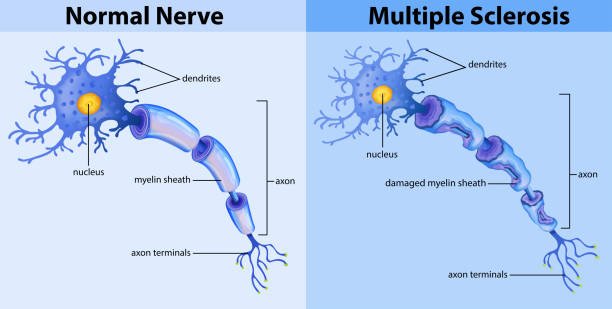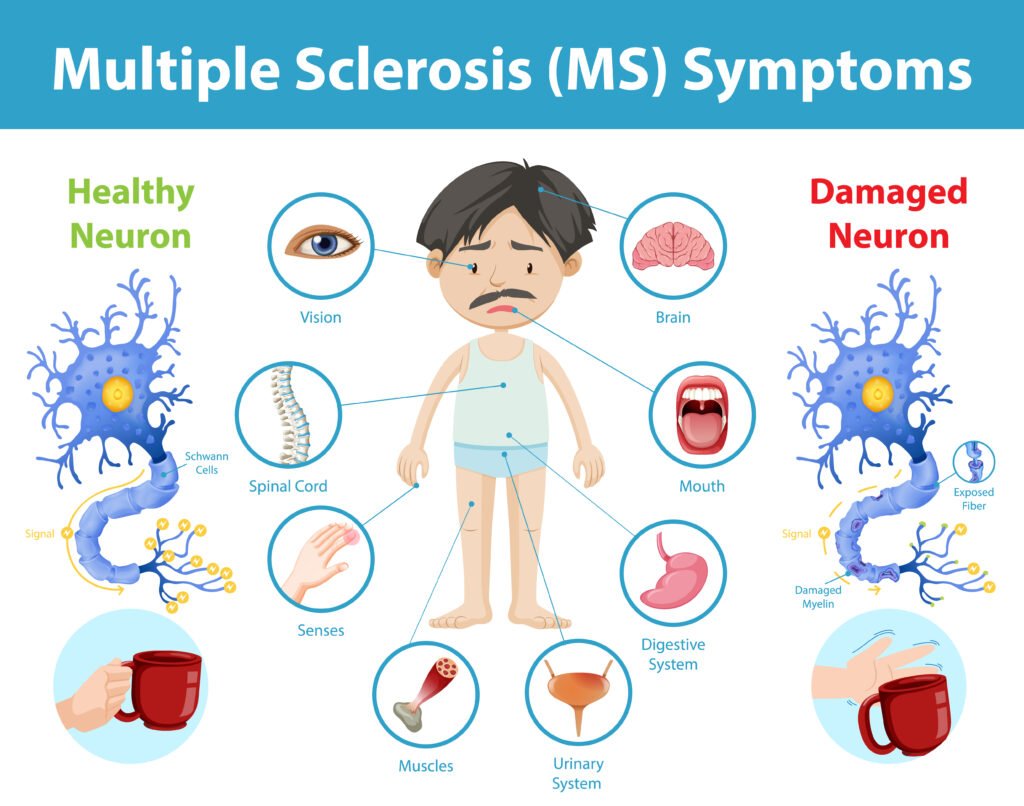Multiple Sclerosis

Multiple Sclerosis is a disabling disease of the brain and spinal cord i.e. central nervous system. There is a protective sheath known as Myelin which covers the nerve fibers and causes problems in communication in the brain and the rest body. This disease can cause permanent damage to the nerves.
The symptoms of this disease entirely depend on the nerve damage amount and also which nerves are affected. Many people suffering from MS lose the ability to walk while many others experience long remission periods.
Multiple Sclerosis Symptoms
The symptoms of the varicose veins vary from person to person and depend on which nerve is affected. Mostly the movement gets affected in this disease like:
- Numbness or weakness in one or more limbs especially in one side of the body.
- Electric-shock sensations along with neck movements.
- Unsteady gait, lack of coordination, Tremor.
- Loss in vision either partially or complete; pain during eye movement.
- Double vision problems
- Blurriness in Vision
- Fatigue
- Dizziness
- Tingling and Pain
- Problems in the bladder and sexual problems.

Types of MS
The different types of Multiple Sclerosis are:
Clinically Isolated Syndrome (CIS)
In this syndrome, the symptoms last for at least 24 hours. The symptoms are because of demyelination in the CNS.
Relapsing-remitting MS (RRMS)
Relapsing-remitting MS (RRMS) involves disease relapses followed by remissions. In these periods, the symptoms are mild and no disease progression.
Primary Progressive MS (PPMS)
In this disease, the symptoms are more frequent and highly worse. However, short time stability can also occur. “Active” and “Non-active” terms describe these activities.
Multiple Sclerosis Causes
There are no specified causes of the Multiple Sclerosis. However, as per the doctors, in this disease, the immune systems start attacking its own tissues. It damages a protective layer of myelin around the nerve fibers. Myelin acts as an insulating layer of the electric wires. When it gets damaged, and the nerve fiber is exposed, the messages traveling along the nerve gets slows down or blocked.
Many researchers believe that there are some environmental factors and genetic problems that trigger this disease.
Multiple Sclerosis Diagnosis
To diagnose Multiple Sclerosis, the doctor will perform a neurological exam, and many other tests to determine if you have MS.
The tests include in the diagnosis are:
- MRI Scans
- Blood Tests
- Visual Evoked Potentials Test
- Spinal Tap
Multiple Sclerosis Treatment
He treatment can greatly reduce the symptoms and the progression of the disease. There many medicines and therapies available which are very effective in the multiple sclerosis treatment.
If you are looking for Multiple Sclerosis Treatment in Jaipur, you should consult Dr. Prateek Sharma, one of the best neurologists of Bhopal. He is having a very good record of successful treatment in the complex neuro diseases such as Alzheimer’s disease, Parkinson’s disease, stroke, brain hemorrhage, etc.
Risk Factors of Multiple Sclerosis
There are some risk factors which increase the risk of multiple sclerosis:
- Age: Multiple Sclerosis can occur at any age, but normally affects people within the age of 16 to 55.
- Sex: Women are nearly 2-3 times more likely to suffer from multiple sclerosis in comparison to men.
- Family history or Genetic Factors: If your siblings or any family member has suffered from this disease then you are more likely to suffer from it.
- Infections: There are a number of viruses linked to the Multiple Sclerosis disease such as Epstein-Barr, the virus which causes infectious mononucleosis.
- Vitamin D: Low exposure to sunlight which in turn reduces the amount of Vitamin D linked with a greater risk to the Multiple Sclerosis disease.